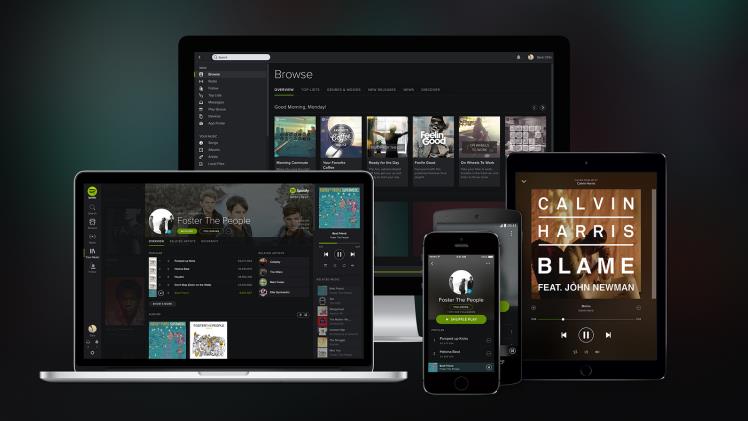In the fiercely competitive music streaming industry, Spotify has emerged as a trailblazer, revolutionizing the way we consume and discover music. I work in the entertainment industry, at Tixel, the safe ticket resale site. Here are some things I’ve noticed about a similar industry – music streaming. As an industry disruptor, Spotify has not only managed to capture a significant market share but also sustain its competitive advantage over the years. In this article, we explore the key factors that have contributed to Spotify’s ongoing success and examine how the company has maintained a stronghold in the ever-evolving music streaming landscape.
I. Continuous Innovation and Adaptability:
One of the core pillars behind Spotify’s competitive advantage lies in its relentless pursuit of innovation and adaptability. The company has consistently introduced new features, improved its user experience, and expanded its offerings to meet the ever-changing demands of music listeners. Whether it’s integrating podcasts, introducing personalized playlists, or experimenting with algorithm-driven recommendations, Spotify stays ahead of the curve. By embracing emerging technologies, such as machine learning and artificial intelligence, Spotify provides a cutting-edge platform that keeps users engaged and satisfied.
II. Extensive Music Library and Licensing:
A substantial music library is a key aspect of Spotify’s competitive advantage. With millions of tracks spanning various genres and artists, Spotify offers users an unparalleled selection to discover and enjoy music that aligns with their tastes. Moreover, Spotify has invested in securing licensing deals with major record labels and independent artists. By establishing strong partnerships, Spotify ensures that its platform offers a comprehensive and diverse selection of music. This robust library has become a significant competitive advantage, attracting both artists and music enthusiasts to the platform.
III. Data-Driven Insights and Personalization:
One of Spotify’s standout features is its ability to leverage user data to deliver personalized recommendations and curated playlists. Through sophisticated algorithms and data analytics, Spotify analyzes user behavior, listening habits, and preferences. This data-driven approach allows Spotify to offer tailored music suggestions, enhancing the user experience. By understanding individual preferences and delivering relevant content, Spotify has become a go-to platform for discovering new music and creating personalized soundtracks for different moods and occasions.
IV. Strong User Engagement and Community Building:
Spotify has successfully fostered a strong sense of community among its users. Through features like collaborative playlists, social sharing, and the ability to follow and connect with friends, Spotify encourages interaction and engagement. This community aspect not only promotes user retention but also generates valuable user-generated content, playlists, and recommendations. The active engagement of users further enhances the overall user experience, making Spotify a platform where music enthusiasts can connect, discover, and share their passion for music.
V. Strategic Partnerships and Integration:
Spotify has forged strategic partnerships with major players in the industry, including music labels, artists, and even other technology companies. Collaborations with artists for exclusive releases and partnerships with brands for targeted advertising have bolstered Spotify’s competitive edge. These partnerships not only provide Spotify with access to exclusive content but also help drive user acquisition and increase user engagement. Additionally, Spotify’s integration with popular platforms and devices, such as social media platforms, smart speakers, and automotive systems, has expanded its reach and made it a ubiquitous presence in the digital music ecosystem.
VI. Continuous Growth and Global Expansion:
Spotify’s ambitious growth strategy, coupled with its relentless efforts in global expansion, has been instrumental in maintaining its competitive advantage. By entering new markets, building relationships with local artists, and tailoring its services to different cultural contexts, Spotify has gained a significant foothold worldwide. This global presence not only expands its user base but also strengthens its position as a leader in the music streaming industry. By adapting its offering to the unique preferences and tastes of diverse markets, Spotify has ensured its relevance and dominance on a global scale.
Spotify’s ability to maintain a competitive advantage in the dynamic and highly competitive music streaming industry can be attributed to a combination of factors. Through continuous innovation, extensive music licensing, data-driven personalization, community building, strategic partnerships, and global expansion, Spotify has solidified its position as a leader in the market.
Data-driven insights and personalized recommendations have become a hallmark of the Spotify experience. The platform’s algorithms analyze user behavior, listening habits, and preferences to curate personalized playlists and recommendations tailored to each individual. By leveraging user data, Spotify provides a personalized and engaging music discovery journey, allowing users to explore new artists and genres that align with their tastes. This level of personalization not only keeps users engaged but also enhances their overall music streaming experience, setting Spotify apart from its competitors.
Global expansion has been a key growth strategy for Spotify. By entering new markets and tailoring its services to different cultural contexts, Spotify has successfully expanded its user base and strengthened its position as a global leader. The company has actively sought partnerships with local artists and music labels, allowing it to offer localized content and connect with diverse audiences. This approach ensures that Spotify remains relevant and appealing to users around the world, further solidifying its competitive advantage on a global scale.
In conclusion, Spotify’s sustained competitive advantage can be attributed to its continuous innovation, extensive music library, data-driven personalization, user engagement and community building, strategic partnerships, and global expansion efforts. By consistently evolving and adapting to meet the evolving needs and preferences of music listeners, Spotify has established itself as a frontrunner in the music streaming industry. As the company continues to push boundaries and explore new avenues, its competitive advantage remains intact, ensuring that it will remain a dominant force in the industry for years to come. Buoc Chan Lang Tham Nguyen Si Kha • Rainy Day Memories • 2023

